This House believes that after Gaza, Arab unity is dead and buried
Sunday February 15 2009
MOTION PASSED
by 77% to 23%
Transcript
Order of speeches
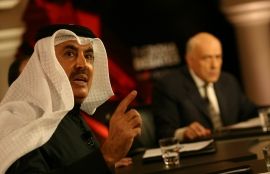
- Introduction
- Nasser bin Hamad Al-Khalifa
- Daoud Kuttab
- Mouin Rabbani
- Abdulaziz Sager
- Audience questions
- Vote result
Introduction
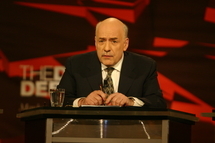 TIM SEBASTIAN
TIM SEBASTIAN
Ladies and gentlemen, a very good evening to you and welcome to the latest in our series of Doha Debates coming to you from the Gulf state of Qatar and sponsored by the Qatar Foundation. Last month's violence between Israel and the Palestinians produced 13 Israeli fatalities, 1300 dead Palestinians, and an Arab world deeply divided in its response. From anger to silence to threats, Arabs have shown a range of different emotions, but little in the way of concrete steps. Are they biding their time to work out a comprehensive strategy, waiting to see what the new American administration will do, or have they collapsed into a state of terminal confusion? Well, that's the basis of our motion tonight: "This House believes that after Gaza, Arab unity is dead and buried," and as ever, our panellists have sharply opposing views. Speaking for the motion, Nasser bin Hamad Al-Khalifa, former Qatari ambassador to Washington, London and the United Nations. He's currently studying for a doctorate in law at the University of Leeds in the United Kingdom. With him, Mouin Rabbani, a Palestinian political analyst based in Amman, Jordan, and a contributing editor of Middle East Report. He's a senior fellow at the Institute for Palestinian Studies and was special advisor to the International Crisis Group on Middle East issues. Against the motion, Daoud Kuttab, award-winning Palestinian journalist, once jailed by Yasser Arafat for broadcasting the proceedings of the Palestinian Legislative Council. He set up the world's first internet radio station, AmmanNet, and served for a year as Ferris Professor of Journalism at Princeton University. And with him, Abdulaziz Sager, a Saudi businessman who's chairman and founder of the Gulf Research Centre based in Dubai. He's on the advisory group for the UN's fourth Arab Human Development report and a regular contributor to regional and international media. Ladies and gentlemen - our panel. [Applause] So now let me first call on Nasser bin Hamad Al-Khalifa to speak for the motion.
Nasser bin Hamad Al-Khalifa
Speaking for the motion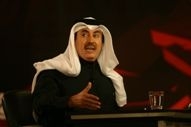
NASSER
AL-KHALIFA
Well,
thank you, sir, and thank you all. I
wish I could have agreed with the notion that there ever was an Arab
unity. There never was an Arab unity
because since we came out of colonisation we've been ruled - and all the Arab
countries - by dictators whose interest is only to stay in power and to reap
the benefit of the wealth of these countries for their own families or their
own associates. And to support that, when, in the ‘50s and ‘60s, there was an
Arab cold war, in the ‘70s, there was only one movement in Arab history where
they put their forces together and they were able to regain some of their lands
in 1973. But since then, we had Beirut being bombarded for three months, and
being occupied by the Israelis in 1982 and there was no Arab unity. We had, you know, the Palestinian massacre at
Ein Al Hilweh and Sabra and Shatila, there was no Arab unity. Nobody took care to make sure that the
perpetrators were taken to the court of justice, and in 1990, Kuwait was
invaded by another Arab country, and there was no unity among, you know, among the
Arab states and when I'm talking about unity, look, Arab people, they always
aspire to have unity, but when it comes to the political regimes, they never
work for Arab unities. Arab unity is the
antithesis of regimes of dictatorship.
In 2006 we had the bombardment of the Lebanese and the killing of the
Lebanese and there was no Arab unity. I
haven't seen it. And now, 2008/2009, we
are all witnesses, we have seen it, the whole world has seen it, where was Arab
unity? They didn't even agree to have
one conference to deal with the massacre, the killing field and the massacres
by the Israelis of the Palestinian people.
So there never was an Arab unity.
Yes, there is hope among the people, but please don't believe there ever
was an Arab unity. Thank you.
TIM
SEBASTIAN
Nasser
Al-Khalifa, thank you very much indeed.
They actually held five summits in two weeks, didn't they, including one
in Kuwait where they offered $2 billion in reconstruction to Gaza? That's a show of unity, isn't it?
NASSER
AL-KHALIFA
Well
...
TIM
SEBASTIAN
$2
billion reconstruction?
NASSER
AL-KHALIFA
Well,
until the money is spent, I don't know how much of it will go to the
Palestinians. I assure you a lot of the
money will go to other people. Look, the
Palestinians were...
TIM
SEBASTIAN
But
that's the same with everybody who gives aid, it's the same with all
international bodies and all international organisations. But the fact that they sat down, they sat
down five times not necessarily the same leaders at the same summit, but they
sat down and they agreed a $2 billion reconstruction programme. Now, that's a sign of unity - you can't then
say that it's dead and buried, can you?
NASSER
AL-KHALIFA
No,
you know, that is it not the sign of unity.
That is a sign to justify, to show that they care, but they never care.
TIM
SEBASTIAN
But
how else would they show that they're going to care, if they didn't dig deep in
their pockets? What do you expect them
to do? What would unity look like to
you?
NASSER
AL-KHALIFA
Unity
looks like they have to share the wealth and they have to have one flag, they
have to have one Minister of Foreign Affairs, one Minister of Defense, and they
have to have the people voting for their leaders - not to have, even the junta
of one of the Arab regimes during the killing of the Palestinians in Gaza they
were saying ..
TIM
SEBASTIAN
You're
asking a lot. Unity is action, isn't it?
NASSER
AL-KHALIFA
Yes.
TIM
SEBASTIAN
It
doesn't matter whether you have one minister or 22 ministers.
NASSER
AL-KHALIFA
No.
TIM
SEBASTIAN
If
you take concerted action, that is unity isn't it? Co-operation is unity.
NASSER
AL-KHALIFA
Unity
is when the political leadership take care of their people, not when the
leadership does not give a damn about them, only to have conferences for show.
Tell me ...
TIM
SEBASTIAN
Leaders
have conferences and the people have demonstrations. They looked pretty united on the streets,
didn't they?
NASSER
AL-KHALIFA
Well,
they could have from day number one, when the Israelis startedto violate every
international convention, they should have said to the world: "Israel has
to stop, we will lower our oil production, we are going to pull our money
...", a lot of (inaudible) they
have lost it, "we are going to treat every country according to their
position towards the Palestinian people."
They haven't done it.
TIM
SEBASTIAN
All
right, okay. Nasser Al-Khalifa, thank
you very much indeed. Now let me please
ask Daoud Kuttab to speak against the motion.
Daoud Kuttab
Speaking against the motion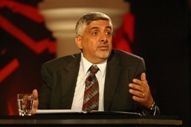
DAOUD KUTTAB
Well, I agree with what Nasser said. The Arabs have not been united and therefore you cannot kill something that is not there, so by your own argument, I am against this resolution because the house resolution is that Arab unity is dead after Gaza, that means before Gaza there was unity and by your own statements, you proved the point that this resolution should not be voted for. Look what happened despite the differences there has been as a result of Gaza. More Arab public unity, more Arab popular unity, more Arab linguistic unity. Look at what happened in satellite television. There is an Arabic standard language in Arabic, colloquial language. Arab satellite has unified the Arabs, even in the colloquial language. Now we have a new Arabic called satellite Arabic. People from Morocco to Bahrain to Qatar to Kuwait speak all on Arab television, with the same language, they understand each other. We have popular support. Gaza has brought in, from people who had forgotten about the Palestinian cause, a new revival of interest in the Palestinian cause. We have informational unity. Arabs are more united by knowing more than they knew 20 years ago when governments and media controlled what information they got. Now people are much more aware. Donor funding: there is funding coming from all levels, from young people, from women, from poor and rich, all are funding and giving support to Gaza, that means people are united. Look at what's happening in the streets. People are demonstrating in favour of an Arab feeling that they have with the Arabs. In the past we had superficial unity, the Ba'ath Party, Abdul Nasser gave us the unity from the top down. Now we're getting popular unity and the Internet, Facebook, you put in Google, the word Gaza and you see how many times the word comes up. Culture: the Arabs are using now the word Gaza to mean Azzah, Azzah means pride. People are proud of the steadfastness of Palestinians in Gaza, so by your own word, I think we should vote against this motion.
TIM SEBASTIAN
Daoud Kuttab, thank you very much indeed. I'm amazed you talk about informational unity a year after the Arab League took the step of trying to restrict satellite broadcasting to a degree they'd never seen before.
DAOUD KUTTAB
And they failed.
TIM SEBASTIAN
Well, they did it, didn't they?
DAOUD KUTTAB
They tried.
TIM SEBASTIAN
There was unity, all but two states, all but two states agreed, all but two states.
DAOUD KUTTAB
They passed a non-binding resolution by the Arab League and they failed, and Gaza proved that Arabs are united, the information...the young people here, they found out about Gaza from the satellite, from the Internet..
TIM SEBASTIAN
Even the boss of the Arab League admits that the thing is split from top to bottom...
DAOUD KUTTAB
The Arab League is superficial...
TIM SEBASTIAN
Look what he says: "The Arab world is going through a dangerous situation and the current Arab split affects every aspect," - every aspect. How much unity do you see among the people of Iraq in their civil war?
DAOUD KUTTAB
There was no unity before.
TIM SEBASTIAN
How much unity among the people of Lebanon?
DAOUD KUTTAB
There was no unity before. If you believed in people, as I believe ...
TIM SEBASTIAN
How much unity do you see?
DAOUD KUTTAB
... if you believe in these young people, people are going to go up and they will insist on being united.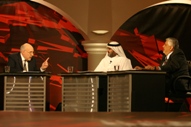 TIM SEBASTIAN
TIM SEBASTIAN
Let's deal with the realities, Daoud Kuttab. How much unity do you see among the people of Iraq these days?
DAOUD KUTTAB
There is a lot of unity among the people.
TIM SEBASTIAN
Where? Where?
DAOUD KUTTAB
Look at the voting in Iraq.
TIM SEBASTIAN
They've had a civil war, for heaven's sake. You stand on the streets of Baghdad and talk about unity with a gun at your head.
DAOUD KUTTAB
No, there is interference of regional and external forces, but the people of Iraq and the people of Palestine ...
TIM SEBASTIAN
For you sitting comfortably in a studio, maybe it looks unified. Try being in Sadr City these days.
DAOUD KUTTAB
I live in Palestine, I see what the situation is. I'm sure there is unity among the people. Arabs are more united than Europeans.
TIM SEBASTIAN
And in Lebanon, in Lebanon do you see much unity in Lebanon these days?
DAOUD KUTTAB
Our leaders are not united, but the people are united.
TIM SEBASTIAN
And your leaders are not people?
DAOUD KUTTAB
They are... some of them have other agendas.
TIM SEBASTIAN
Ah, okay, all right. Daoud Kuttab, thank you very much indeed. Let me now ask Mouin Rabbani to speak for the motion please.
Mouin Rabbani
Speaking for the motion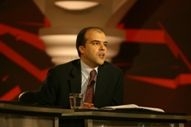
MOUIN RABBANI
Israel's recent war on the Gaza Strip has demonstrated yet again that the Arab state system is as dead as Monty Python's parrot. The corpse of this system is so badly decomposed that its putrid smell reeks from Marrakech to Muscat. It is neither re
ady nor willing nor able to serve the ambitions of its people, least of all in questions of regional solidarity. The stench is nowhere stronger than that emanating from the League of Arab States. Established under imperial patronage to consolidate the division of the Arab world into separate entities, it is systematically incapable of addressing inter-Arab conflict. A defender of state sovereignty when Arab citizens are on the receiving end of misrule, it does nothing to defend such sovereignty when this is the victim of foreign encroachment and aggression. In Gaza, in Doha, in Kuwait, even in Davos, the Arab League was reduced to a laughing stock. As for the member states of this tragic-comic organ, they failed to even fail to do nothing to challenge Israel's most recent war. Some actively assisted Israel. Others generously supported it, while yet others played the slaughter for partisan advantage rather than Arab salvation. At least Nero fiddled. Most of our leaders, resting on increasingly narrow domestic constituencies, pray towards Washington, and for the last eight years, their prophet has been a moron named George W. Bush. How can they possibly serve the Arab interest when they reject even a national agenda? During the recent war, it was easier to demonstrate in support of the Palestinians in Tel Aviv than in Ramallah or many Arab capitals. Preferential treatment at our borders is reserved for Europeans, Americans and increasingly Israelis. If I pass more quickly than you on account of my European passport, know it would be quicker still if I didn't have an Arab surname. We are now at the stage where the success of Israeli wars has become part of the security strategy of growing numbers of our regimes. There can be no Arab unity nor even meaningful Arab co-ordination under such circumstances.
TIM SEBASTIAN
Mouin Rabbani, we'll stay away from name-calling perhaps about George W. Bush, but how actively did Arabs support Israel in the recent conflict?
MOUIN RABBANI
Well, one needs only to look at Gaza's only border with the Arab world to see how actively Arab states were supporting Israel's campaign against the Gaza Strip.
TIM SEBASTIAN
What did they do?
MOUIN RABBANI
Kept it closed, prevented even medicine from entering and even severely wounded people from exiting under, you know, the rubric that this was some kind of mortal threat to national security.
TIM SEBASTIAN
That's quite a charge.
MOUIN RABBANI
It's a reality unfortunately. 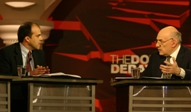 TIM SEBASTIAN
TIM SEBASTIAN
When you talk about Arab unity and you're certain that it is dead and buried, you're certain that it is never coming back - if you support the motion, why don't you look at the way that the Arabs are biding their time with the new administration, the new US administration? Why shouldn't they wait and see which way Barak Obama is going to go? Why shouldn't they do the lobbying that's going on in Washington before they decide what actions they're going to do? I already talked about the $2 billion reconstruction programme that they agreed in Kuwait, that's no sign of unity, as I mentioned to your colleague?
MOUIN RABBANI
Salvation is not going to come either from Tel Aviv or Washington.
TIM SEBASTIAN
That's not my point. My point is that they agreed a $2 billion reconstruction. They agreed a peace plan in 2002.
MOUIN RABBANI
And did nothing, and did absolutely nothing with it - simply waited for the Israelis and the Americans …
TIM SEBASTIAN
Well, the Israelis didn't exactly respond to it, did they?
MOUIN RABBANI
Then what did they do in a unified fashion?
TIM SEBASTIAN
The thing is still on the table, the peace plan is still on the table. At least they agreed it.
MOUIN RABBANI
That's part of the problem, which is part of the problem.
TIM SEBASTIAN
They were unified enough to agree a peace plan in 2002, that's the point, isn't it?
MOUIN RABBANI
Those are, it's hot air, it's words. When you set out an objective and you refuse to do anything meaningful to achieve that objective, even when that objective is…
TIM SEBASTIAN
If the other side doesn't pick it up, what are you supposed to do, in diplomatic terms?
MOUIN RABBANI
Then you either use the resources you have to achieve that objective, or you change your objective. Neither of those things were done.
TIM SEBASTIAN
It was an objective to achieve peace. What would you have had them change the objective to?
MOUIN RABBANI
Achieve peace then, don't just sit back and let the other …
TIM SEBASTIAN
It takes two, doesn't it? It takes two sides to do it.
MOUIN RABBANI
Well, when Israel's response to the Arab peace initiative is to obliterate half of Jenin refugee camp, re-occupy the West Bank, accelerate settlements, and the US response by letting Israel go its way, and you do nothing in return - I guess that is Arab unity of a sort, but not the one that the peoples of this region aspire to.
TIM SEBASTIAN
Mouin Rabbani, thank you very much indeed. Now let me call please on Abdulaziz Sager to speak against the motion.
Abdulaziz Sager
Speaking against the motion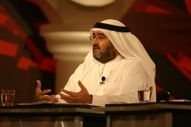
ABDULAZIZ SAGER
Thank you, sir. Let me start by saying 40 years ago, we've heard the people talking about the dead and buried Arab unity. The fact that we are still debating it today - it's not dead and it's not buried. This is my position. I think there are a few issues here I'd like to mention. One, if we look at, I mean, if you look at other examples like the EU, they may have the unity of the act, and that's what they thought, they will have the unity of the act, not the unity of the nation. But at the same time we have seen their position on Afghanistan, we've seen their position when the US wanted to invade Iraq, so having a unity somewhere, it does not mean that you should have a fully unified position. This is a very deep emotional feeling that we have in the Arab world. Some people, they think it's a dream and some they think, no, it's partially a dream, partially a reality. If you look to the achievements that are taking place within the question of the Arab unity, in this lovely city Doha today we have three issues going on: the mediation on the Dafur question, the previous one on the Lebanese second civil war. We've had the al-Houthis (peace talks between Yemen and the al-Houthis), I mean, this is the three serious issues in the Arab world, that, you know, Qatar are taking a place to intermediate to try to solve a problem. Saudi Arabia did the same thing between the Palestinians, Hamas and Fatah, when they held the Mecca meeting. We've seen it also between the Iraqis when Saudi also hosted the meeting, so there is an achievement. The fact that we've all agreed in 2002 the King Abdullah peace initiative, an Arab initiative, which was agreed fully by all the Arab states at that time - this shows there is a unity. We are willing to accept a two-state solution. The fact there is no state today would ... that all supported the Palestinians, disregarding the political parties - Hamas in Gaza or other - they all support it for humanitarian reasons, and they were all against the Israeli act against the Palestinians in Gaza - this proves there is a unity, when you see demonstration in Morocco, in Iraq, in Algeria, in Egypt, everywhere in the Arab world there was, you know, civil demonstration by the people supporting the Palestinian, this is an Arab unity. This is a very deep embedded feeling in our heart, in our minds, that we will not kill, it will not disappear, it will be always there. Sometimes we might be, you know, and we have to differentiate between state and people. This is a people feeling. The states sometimes, they differ because they have their own local interest, they have their own domestic, regional and international interests, but we're not expecting them to have a one complete stand in that way. You've just mentioned the $2 billion, it started in Qatar, when the Emir of Qatar announced the $250 million, the king of Saudi Arabia and Kuwait have stated the rest of the two billion - it became a useful and a great initiative to support the people of Gaza.
TIM SEBASTIAN
All right, Abdulaziz Sager, thank you very much indeed. Here's what Hamas's deputy foreign minister thinks about Arab unity: "The Arabs," he said "have always been divided. I've never seen the Arabs united on any issue." There, from Gaza.
ABDULAZIZ SAGER
Oh, I disagree with him.
TIM SEBASTIAN
The view from Gaza.
ABDULAZIZ SAGER
I disagree.
TIM SEBASTIAN
If you're going to disagree, you have to disagree also with the current head of the Arab League, as I said, he said: "The split affects every aspect of the Arab world." Where is this unity? You're talking about a dream and an aspiration, but that's not unity, is it?
ABDULAZIZ SAGER
Well, you know, you start with a dream to move to reality.
TIM SEBASTIAN
Yes, but a dream isn't unity. Unity is action, it's co-operation, it's engagement. It's all the things that the Arab world shows no sign of offering.
ABDULAZIZ SAGER
So there is, all these issues are there, all these issues are there.
TIM SEBASTIAN
There are hopes, there are dreams, Abdulaziz Sager.
ABDULAZIZ SAGER
I mean, sometimes we see the difficulties ...
TIM SEBASTIAN
Where is the action, where are the concrete steps? They're being lamented, the lack of them, from all over the Arab world over the last few weeks.
ABDULAZIZ SAGER
When we had the civil Lebanese war, it was the Taif agreement that brought them together. When we had the second war it was Doha that brought them together. When we had the ...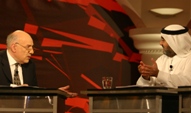 TIM SEBASTIAN
TIM SEBASTIAN
But the mere fact that you had a civil war, you had a civil war in Lebanon, you had a civil war in Iraq, you have civil war in Palestine - where is the unity? For heaven's sake, we're talking about one of the most deeply divided regions of the world.
ABDULAZIZ SAGER
I don't think it was that long before we saw the Irish problem was solved. I mean, it was still there ...
TIM SEBASTIAN
Well, you can't really compare the Irish problem to the Middle East, can you?
ABDULAZIZ SAGER
Domestic problems can happen to each and every country, that's not a problem.
TIM SEBASTIAN
Domestic? You've got three civil wars that have been raging in the Arab world, that's something of a record, isn't it?
ABDULAZIZ SAGER
But I guess you know there was, in the world war, you know, happened, you know, in the western world, so it was not only in the Arab world.
TIM SEBASTIAN
Some comparison. Abdulaziz Sager, thank you very much indeed.
ABDULAZIZ SAGER
Thank you.
TIM SEBASTIAN
I'm going to throw this open now to the audience and take some of your questions. Just a reminder that we are debating the motion "This House believes that after Gaza, Arab unity is dead and buried." All right, I'm going to take Saad Eddin Ibrahim in the front row, you sir.
Audience questions
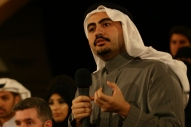 AUDIENCE (M)
AUDIENCE (M)
That's all right. May I ask those who are for the motion, how do you explain the fact that the Arab world was emotionally united in the streets? Demonstrations from Morocco to Bahrain - every Arab city showed its solidarity with Gaza. Don't you consider this emotional solidarity the infrastructure of unity? And don't you also know that many countries, many societies, have remained divided until their people were given a free and fair choice? Look at Europe, all the wars, including civil wars, but yet, after the Second World War when dreamers - you've talked about dreams - presented the united European dream - in due time they were able to do it. For the first time democracy and freedom led to unity. Give democracy and freedom to the Arab world and you will see the people of the Arab world unite.
TIM SEBASTIAN
Nasser Al-Khalifa.
NASSER AL-KHALIFA
Well, thank you, sir. I think emotion is not an action. Emotion is feelings, emotion cannot be unity. Unity has to be concrete. I'd like to ask people in this room if they are not from the GCC and they are Arab, they needed a visa to get in here or to any other GCC countries - so where is the unity? Yes, in Europe they had wars, but in Europe they had tradition and political culture and they have the rule of law and they have the right to vote. In the Arab world, we don't have the right to vote, we don't have democracy. So, yes, when democracy comes, when people can vote, when we can change our governments, when we get rid of corrupted officials, when we have accountability, then I assure you and I agree with you, we will have unity in the Arab world. Before that, there's no way sir.
TIM SEBASTIAN
Daoud Kuttab?
DAOUD KUTTAB
Yes, I think you are wrong. I mean, your country itself fell for this emotional support from Gaza and they had to suspend their relations with Israel. Qatar strategically had to have... pull away from the Israelis because of the popular support. Syria, who had indirect talks with the Israelis, had to suspend them. Jordan, the Palestinian Authority had to stop their negotiations with Israel - so the popular support did affect how governments act. I don't agree with you that you should belittle the emotional popular support that was for Gaza. As to what Mouin said in his opening remarks, I think he made a few mistakes.
TIM SEBASTIAN
But where was this emotional support when the Palestinians had been sitting for decades in refugee camps - where's that emotional support?
DAOUD KUTTAB
I think there have been problems. I think the Arab ...
TIM SEBASTIAN
Bit more than a problem, Daoud Kuttab.
DAOUD KUTTAB
... media, and when the media was out of the hands of governments, people are much more aware now, they know what's happening. No longer are there countries who control...
TIM SEBASTIAN
You say they didn't know there were tens of thousands of Palestinians were sitting in refugee camps?
DAOUD KUTTAB
I'm sorry?
TIM SEBASTIAN
You say that the Arab world didn't know that tens of thousands of Palestinians were sitting in refugee camps - they knew perfectly well, didn't they?
DAOUD KUTTAB
There is an issue of negotiations, there is an issue of negotiations ...
TIM SEBASTIAN
There's an issue of not caring actually, isn't there?
DAOUD KUTTAB
No, the right of return is a very important right, the Palestinians insist on wanting to return to their country. I don't think that hurts the unity, but what I say is that today's young people, today's Arab people or the majority of the people have much more information, are able to discern the information they have, and they're very active. Mouin said in Tel Aviv, there were demonstrations in Ramallah, there was ... that's not fair.
MOUIN RABBANI
That's not what I said.
DAOUD KUTTAB
In Ramallah there were demonstrations.
TIM SEBASTIAN
Can we just let him reiterate what he said?
MOUIN RABBANI
Sure, I said it was easier to demonstrate in Tel Aviv than in Ramallah.
DAOUD KUTTAB
But, you know, so you're saying Israel is a democracy, and the Arab world is not a democracy, what are you saying?
MOUIN RABBANI
No, that's... no.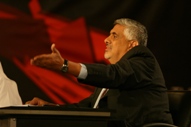 DAOUD KUTTAB
DAOUD KUTTAB
What are you saying?
MOUIN RABBANI
The point I'm making is that at this time our regimes have become so repressive that even on the central issue that matters to Arab citizens throughout the Arab world - the question of Palestine - despite these new-found media freedoms and so on that you're referring to, the reality is the Arab world has never been more divided on how to respond to the Israeli war against the Palestinians.
DAOUD KUTTAB
You live in Amman, Mouin. In Jordan there was 450 demonstrations. The Jordanian government had to suspend the law that prevents people from demonstrating without a licence. That's a proof that the governments react to the people.
NASSER AL-KHALIFA
Daoud, it is not a matter of demonstrating. To me it is not a matter of governments even allowing or not allowing people to demonstrate. Demonstration is not unity. Unity is when we share in the pain, when we are together, when we build our future free of interference, when the Palestinians who have been the victims of European colonialism and Arab regimes' interference ...
DAOUD KUTTAB
I agree.
NASSER AL-KHALIFA
Many dictators came to power using the Palestinian misery, and today ...
DAOUD KUTTAB
Unity is not dead, Arab unity.
NASSER AL-KHALIFA
... we have a new cold war in the Arab world and every regime is using the Palestinian misery just to show that they are doing something.
TIM SEBASTIAN
Okay, I'm going to take a brief comment from Abdulaziz Sager and then we're going to move on.
ABDULAZIZ SAGER
Well, I'm just saying that governments sometimes, they have their limitations. We should not expect from them more than what they can deliver. I mean, this is a reality.
TIM SEBASTIAN
Maybe we get the governments we deserve. I'm going to take a question from the lady at the back.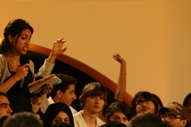 AUDIENCE (F)
AUDIENCE (F)
Good evening. I'm an Indian by origin but I've lived in the Middle East all my life. I'm a student at Carnegie Mellon University in Education City, so my question is to Nasser bin Hamad al-Khalifa. So you talk about how Arab unity has never existed, ever. We're talking about how it's actually gone down after the Gaza situation. Today, after the situation and the plight of the people in Gaza, the awareness has actually increased in the Arab world by a very, very great extent, not only in the governments but at the grass roots level. The people are fighting again, the people are angry. The students there are campaigns especially in Doha, Al Fakhoora campaign - students today in Texas A & M University they had a bake sale, it's happening for the millionth time. People know what's happening. People are fighting together.
TIM SEBASTIAN
Okay, and your question is?
AUDIENCE (F)
My question is, how can you say that unity has actually been disrupted - it's actually increased, if anything.
TIM SEBASTIAN
All right, let him answer, thank you.
NASSER AL-KHALIFA
Well, I think we are talking about two levels. We are talking about the official levels and the street levels. Yes, even when I was your age, I was aware of the Palestinian misery and I wanted to do everything to alleviate it, and many people like me, all the people who are my age in this room - but that did not change. We are talking about unity, aspiration, yes, but when we talk about reality, every Arab needs a passport to go through another Arab country. When I am in Europe or the States, I go from one state to the other, nobody stops me, so unity has to be concrete, it has to be realities. It cannot be aspiration. Aspiration is fine but as long as we have the political regimes we have today, as long as we do, there is no way we can have unity.
TIM SEBASTIAN
Okay. Mouin, you wanted say something briefly.
MOUIN RABBANI
What you're saying about popular sentiment is entirely correct. We're not arguing that the Arab people don't have these aspirations. We're not arguing that you've seen perhaps greater levels of pan-Arab solidarity than before. We're talking about what the state system, the leaderships, the rulers do in order to respond to this popular sentiment. They couldn't even have a meeting until after the war was over. That's Arab unity?
TIM SEBASTIAN
Daoud Kuttab.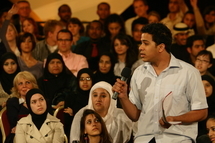 DAOUD KUTTAB
DAOUD KUTTAB
But the house resolution is very clear. "Arab unity" - it doesn't say Arab state unity, it doesn't say Arab governmental or unity, it says Arab unity. For me that is not, I mean, for me you are supporting our position. You're saying that there is Arab unity ...
TIM SEBASTIAN
Okay, let me ask the questioner to come back I know you're itching to come back in, briefly please, briefly.
AUDIENCE (F)
Are you talking, is the proposition talking about political unity, or is the unity in spirit in the Arab countries?
MOUIN RABBANI
Look, if it was popular sentiment that mattered, we'd be all living in a unitary Arab state.
AUDIENCE (F)
It's not popular sentiment. If you use Qatar as an example, Sheikha Mozah is the patron of the Al Fakhoora campaign which is actually doing a big deal for Palestine.
MOUIN RABBANI
But I think we're talking about the response of the Arab state system to the Gaza war here.
AUDIENCE (F)
The Gaza situation has been mentioned in every single talk by every single Arab leader in the Arab League.
MOUIN RABBANI
So what?
AUDIENCE (F)
Why does that not display unity?
MOUIN RABBANI
Because they didn't lift a finger to stop Israel's slaughter. That's what counts, not what they say. [Applause]
NASSER AL-KHALIFA
What could they do?
TIM SEBASTIAN
Okay. Lady in the front row, I'm going to take a question from you please.
AUDIENCE (F)
Assalaam aleikum. I'm an Indian national but born and raised in Qatar, and my question is: if this house believes that after Gaza, Arab unity is dead and buried, then what do you think, what could be the main elements behind Arabs lacking unity?
TIM SEBASTIAN
Mouin Rabbani.
MOUIN RABBANI
The regimes and the regional institutions - those are the ones that are dead and buried. Of course there is Arab solidarity at the popular level, from the ocean to the Gulf and so on, no doubt about it, but what matters is not how the people feel, but how the rulers act. That's the definition of Arab unity as far as we're concerned. Europe is the exact opposite. European peoples, they all detest each other, but they have unity through the European Union. That's what counts.
TIM SEBASTIAN
I think 'detesting' is putting it a little strongly. We like their food, thank you very much.
MOUIN RABBANI
Point taken. So, I mean, when we, you know, what matters in this region is how the regimes and the regional institutions act and conduct themselves, and they're more divided than ever. The last two wars, for the first time in the history of the Arab-Israel conflict, we have Arab regimes openly publicly siding with Israel.
TIM SEBASTIAN
Do you take the point?
MOUIN RABBANI
Excuse me?
DAOUD KUTTAB
Can you name countries who are siding with Israel?
MOUIN RABBANI
Look at the statements that were made in 2006 by ...
DAOUD KUTTAB
Can you name a country? You just said countries that sided with Israel.
MOUIN RABBANI
States, governments.
DAOUD KUTTAB
Which, which sided with Israel?
MOUIN RABBANI
Egypt, Jordan, Saudi Arabia in 2006 ...
DAOUD KUTTAB
It's not true, it's not fair, it's not true.
MOUIN RABBANI
... blaming Hezbollah ...
DAOUD KUTTAB
It's not true, it's not true.
MOUIN RABBANI
... for the war.
DAOUD KUTTAB
Mouin, you know it's not true.
TIM SEBASTIAN
Can you let him finish and then come back, thank you very much.
MOUIN RABBANI
And this time around we had the Palestinian Authority, Egypt and Saudi Arabia laying the blame at Hamas's feet for Israel's onslaught on the Gaza.
DAOUD KUTTAB
They all attacked, all the countries you mentioned attacked Israel and said Israel has committed war crimes ...
MOUIN RABBANI
Yes, because it didn't end in 48 hours.
DAOUD KUTTAB
And, no, wait, wait, and they did not support what Israel did. Your statement is not correct, it's not fair.
ABDULAZIZ SAGER
You should not forget that it was the Saudi Foreign Minister who went to New York, trying to push (inaudible) to get the Security Council resolution for that.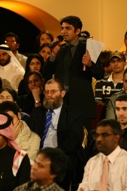 TIM SEBASTIAN
TIM SEBASTIAN
Okay, I'm going to take a question from the gentleman in the second row please.
AUDIENCE (M)
I am from Qatar. I think there is unity between Arabs now that Israel doesn't want peace any more, that Israel now is stepping or slapping on the face of those liberals, the moderate people like me. Those people who believed in peace and supported peace and now Israel wants to prove that they want to make the Palestinians emigrate to Sinai ...
TIM SEBASTIAN
Could we come to a question, could we come to a question please?
AUDIENCE (M)
My question, do you agree that there is unity, that Israel wants to take over Jerusalem and wants to stop the refugees coming back to Palestine and to continue with the violations against the human rights of the Palestinians, that is killing liberal Arab moderate people like me and we're losing our popularity too? Do you think that there is unity or not?
TIM SEBASTIAN
Thank you. Nasser Al-Khalifa please.
NASSER AL-KHALIFA
Well, I think, I think Israel is doing what it has been doing because there was no Arab unity. If there was an Arab unity, Israel cannot act the way it is acting, killing Arabs in cold blood. Listen, it's nice, sentimentality is a good thing. You know, millions of people demonstrated in the streets of London during the invasion of Iraq. Does that mean they had unity with the Iraqi people? No. They saw something wrong and they said: "We are going to demonstrate against it." That happens also in the Arab world. The success of Israel is the failure of the Arab political regimes.
TIM SEBASTIAN
Right, thank you. I'm going to a question in the fifth row please.
AUDIENCE (M)
Good afternoon, I'm Lebanese. Unity between nations is based on common principles and objectives, therefore how can we even consider Arab unity if Arabs don't agree on Israel recognition?
TIM SEBASTIAN
Abdulaziz Sager.
ABDULAZIZ SAGER
Well we don't have to agree on the recognition of Israel, all of us together. Our countries feel that they have a special relation .. is that your question basically?
AUDIENCE (M)
My question is, how can we even consider Arab unity if they don't have common principles and objectives?
ABDULAZIZ SAGER
They do have common principles and objectives. The meeting in Kuwait was discussing the economics issue, you know, which started many, many years ago before. Now they've agreed on the customs union, they put a date at least for that, they agreed certain economics, you know, welfare, they do have a basic principle on the issue of the conflict between Palestine and Israel. There is no disagreement in that. The 2002 Arab summit confirmed they accepted the two-state solution. There is no single country that said "no" to that.
TIM SEBASTIAN
Hamas said no to it.
ABDULAZIZ SAGER
Yes, but Hamas came into power a bit later than that.
TIM SEBASTIAN
They're the ones who were fighting.
NASSER AL-KHALIFA
There never was the same goals. The goals of the Arab regimes are their own interests. Each one is working for his or her interest.
ABDULAZIZ SAGER
Each country has the right to have their own interest at the top of the agenda.
NASSER AL-KHALIFA
The Arab League was created in 1945. The European Union, the common market, was created in 1958, and it was created after two world wars, after the Europeans in World War One used gas against each other, but they were able to move forward.
TIM SEBASTIAN
Let me go back to the questioner here. Do you see any common principles and objectives in the Arab world?
AUDIENCE (M)
We don't see any ...
TIM SEBASTIAN
Do you see any in your home country of Lebanon, among people?
AUDIENCE (M)
In Lebanon there is no any common, there are no common principles because some countries agree with the two-country, with the Palestine and Israel peace, and some other partisans don't agree with them.
TIM SEBASTIAN
Daoud Kuttab, do you want to answer that?
DAOUD KUTTAB
I think, you know, the Arab League is a problem because the Arab League was established ...
TIM SEBASTIAN
He was talking about people, he wasn't talking about the Arab League.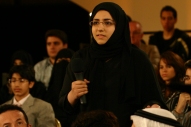 DAOUD KUTTAB
DAOUD KUTTAB
No, no, but the point is, the answer is very important, the connection between his question and the answer about the Arab League. The Arab League was created from top down, the way the Ba'athists tried to do, the way that Abdul Nasser tried to do. What we need is Arab unity from bottom up, and that's why young people here who are united by being Arab, who are proud of being Arab, who use the Arabic language, who use Arab culture, who are proud of that culture and nationality, are the future, and the only thing we need is democracy. The only thing we need in the Arab world is for Arabs to have the right, as he said, you're right, to vote, to change the government, and to get rid of the autocratic leaders who are not allowing people to act in their way.
TIM SEBASTIAN
You want to come back on this?
NASSER AL-KHALIFA
Well, I think, I think you are smart in the way you are always talking about the young people. They are our future and I hope they will succeed ...
DAOUD KUTTAB
It's the majority of the population.
NASSER AL-KHALIFA
They will succeed, they will succeed where you and me and our generation failed. We failed. We failed because we ...
TIM SEBASTIAN
But you're saying it's dead and buried, unity. Are you now holding out hope that it can be resurrected miraculously in the future?
NASSER AL-KHALIFA
They have their future, they can make the future. I cannot make it for them. My generation and his generation, we failed, we failed because of two things, because we accepted the crime of silence, and we accepted the crime of fear. We were silent when we saw something wrong in our societies, and we were always fearful to speak our minds. That is our problem. ([Applause] )
TIM SEBASTIAN
Gentleman in the second row, you sir.
AUDIENCE (M)
Hi. Good evening. I'm a Qatari national. My question is for the speakers against the motion. You cited several examples in your opening remarks regarding what you held to be Arab unity. I have three questions. The first question ...
TIM SEBASTIAN
Brief, please.
AUDIENCE (M)
Very brief. Was you using Facebook as an example of Arab unity or was it an example of the development of social networking? Your example of satellite television, was that an example of satellite television and the development of international media, or was it an example of Arab unity? Don't you think that you are simply hiding behind the veil of globalisation as in using it as an example of Arab unity when it's simply not there?
DAOUD KUTTAB
I think globalisation is a problem and is a challenge and is an opportunity. What I'm saying is, globalisation offered people like me and you the opportunity. How we use that opportunity depends on how we use it. I think many people have used that opportunity. I created the radio station in Amman at a time when radio stations were not allowed. A private radio station in the Arab world today is still not allowed in most countries. I created a radio station on the internet. We were broadcasting from Amman, downloading from Palestine, and then rebroadcasting back in Jordan. We were doing something completely illegal but in a legal way. Technology afforded that opportunity. If people use technology for good or for bad, and I think in Arab unity, you look up how much the word Gaza is online, how much people have actually united using technology and then you will see that there is lots of opportunities to use that.
TIM SEBASTIAN
Did you want to come back on that because I'm not sure your question was answered there, was it?
AUDIENCE (M)
No, my question wasn't answered, and again you used Google as an example. If you search the number of times that the (inaudible) pops up in Google one year ago as opposed to today, it's quadrupled, four times, ten times. That's the same. I think that it's access to the media and the internet and communication between peoples and I don't think that's satisfactory.
DAOUD KUTTAB
And therefore you're informed, you're better informed. What you do with the information is what we heard here. If you're silent, it's a problem. If you go out in the street, you demand your rights ...
AUDIENCE (M)
There were demonstrations in London, and the demonstrations in London were bigger than the demonstrations in most of the Arab countries.
DAOUD KUTTAB
There were two million people in Morocco.
AUDIENCE (M)
I said most of them.
MOUIN RABBANI
But Daoud, while you were downloading, what did the Arab states do to challenge Israel's war on Lebanon? What did they do to stop Israel's war on the Gaza Strip? What have they done since passing this famous Arab peace initiative to halt the expansion of even a single Israeli Jewish settlement in the West Bank?
DAOUD KUTTAB
I am not defending Arab regimes.
MOUIN RABBANI
You are.
DAOUD KUTTAB
No.
MOUIN RABBANI
You are.
DAOUD KUTTAB
I am defending Arab unity, there's a difference. You're saying Arab unity means Arab countries or Arab regimes.
MOUIN RABBANI
If you're saying Arab unity can be established with the current set-up, then you are defending the regimes.
TIM SEBASTIAN
Excuse me, please, don't speak both at once. Daoud Kuttab, come back on that.
DAOUD KUTTAB
I'm saying Arab unity applies on all levels. When I went to Majdel Shams last week, in Golan Heights, people were collecting things for the Golan Heights. When you see Christian Arabs collecting things to repair windows in Gaza, that means there is unity, there is national unity and there is religious unity, people who are Arabs, who use the Arabic language, Arabic culture, are united. And Gaza has helped unite...
TIM SEBASTIAN
Daoud Kuttab, 80 percent of the one million Israeli Arabs wouldn't dream of taking in a Palestinian state, you know that according to the opinion polls last year.
DAOUD KUTTAB
They should not, they should stay where they are.
TIM SEBASTIAN
How much fellow feeling is there, with those in Gaza and the West Bank? None, none.
DAOUD KUTTAB
No, they're planted in their towns and country and they should stay there, whether there is a state of Israel or a state of Palestine, they should not be made refugees.
TIM SEBASTIAN
All right, I'm going to take a question from the lady in the fifth row, the lady with the niqab. Thank you.
AUDIENCE (F)
Assalaam aleikum. I'm Palestinian from the Gaza Strip, and first of all I would like to remind all of us that we're talking about unity after Gaza, and this has only been a month, and when we talk about unity, it does not develop in one month or two months. It takes a long time to develop a union. Second, I would like to address my points to Mr. Nasser bin Hamad. You said: "Unity is not emotions. It's actions," and at the same time you said: "It's sharing pains." So if sharing pains is not emotions, what is emotions? Second ...
TIM SEBASTIAN
I'm sorry, we haven't got time for a list of questions. Did you want to come back on that?
NASSER AL-KHALIFA
Well, I think, you know, emotion, we all have emotions, you know, every moment of our lives. We are talking about unity. There's no unity in the Arab world, you know, look, even until now the Palestinian and Gaza cannot get enough food, either enough food or medicine or even to have tents. They are sleeping outside, on the street, and where is the Arab unity, where are the Arab regimes?
AUDIENCE (F)
If you're talking about political unity ...
NASSER AL-KHALIFA
Of course.
AUDIENCE (F)
... the political regimes do not represent or serve the needs of the Arab nations. But if you're talking about nations, there is a unity there.
NASSER AL-KHALIFA
In the real world, we have within regimes, we have within borders, we have governments, we have passports, we have port controls, that is the reality. If somebody has something in their mind in the future, that is something. I am not in the realm of dreams. You know, everybody has their own dreams. I am dealing with the reality which I see today in front of my eyes.
TIM SEBASTIAN
All right. Gentleman in the sixth row, thank you.
AUDIENCE (M)
I am from the Arab Democracy Foundation.
TIM SEBASTIAN
Which country are you from?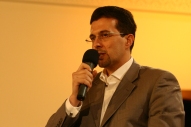 AUDIENCE (M)
AUDIENCE (M)
New Zealand of Moroccan descent. My question is for those who are voting for the motion. I notice that the motion is in the passive voice. If we put it in an active voice who, under the presumption of killing there, who is participating to kill the Arab unity? And second, the analogy that we are making with the European Union is flawed, because there was a superpower with the Marshall Plan back in the European Union.
TIM SEBASTIAN
Okay, let's just deal with your first question. Mouin Rabbani.
MOUIN RABBANI
It's been those entrusted with Arab national security, it's those entrusted with bringing the Arab world together. Those are the ones who have driven the Arabs apart. Those are the ones who have put in all these divisions that we've been talking about. Of course there is pan-Arab sentiment throughout the Arab world. You know, many of the speakers have said that it's now stronger than it has been in a long time. Of course that's true., may it grow. But that's not the issue that we're addressing here. The issue that we're addressing is that Arab divisions are now deeper than ever, and that those who are responsible for bringing the Arabs together have basically killed the project of Arab unity in our generation.
TIM SEBASTIAN
Did you want to come back on that or you accept the answer?
AUDIENCE (M)
I don't accept the answer because I think that there is more analysis that we need, I mean, more levels of analysis.
TIM SEBASTIAN
Okay, well, this is television unfortunately, not always geared to analysis. I'm going to take a question from the gentleman in the sixth row - you sir.
AUDIENCE (M)
Thank you very much. I'm from Pakistan and I'm a mathematics teacher here at ABP. First of all I just want to make a quick correction of Mr. Daoud. Mr. Daoud just said that all the young generation, they are proud to be Arabs. Sir, I'm so sorry, I've been sitting here and listening to the people, they are proud to have American and British accent and that's it, they are no more Arabs. My very quick question is: we are talking about sending aids in the form of money and medicines to rebuild Gaza and all the Arab cities. My question is, why don't we stop those hands who are destroying our homes?
DAOUD KUTTAB
Why do we what?
AUDIENCE (M)
Why don't we stop the hands which are destroying our houses? Why are we sending money to rebuild the houses?
DAOUD KUTTAB
How do we do it? I agree. Give us an idea.
AUDIENCE (M)
So do you remember Sultan Saladin Ayyub? He went to Jerusalem, he fought and he proved that we are Muslims and we are united. What we are doing, we are just sitting here, we are chatting, we are discussing and that's it.
DAOUD KUTTAB
So you think we should go to war?
AUDIENCE (M)
It's not going to work like that.
TIM SEBASTIAN
Would you let him speak, thank you. Daoud Kuttab, do you want to come back on that?
DAOUD KUTTAB
No. I think the Arabs have chosen peace, I think the Arabs have to be united. I agree whole-heartedly that Arab regimes who've been appointed by the Western world in one way or another are not interested in issues, but the people are now rising, and we should keep encouraging them to rise and stand up and change the leaders that are not reflecting the sentiments of the people.
TIM SEBASTIAN
All right, Abdulaziz Sager, what about the first point that the gentleman made, that actually all they're concerned with, young Arabs, is their American and British accents?
ABDULAZIZ SAGER
Well, I am sure the young Arab may wish to have a better travel document that would allow them to access without staying in a long queue when they arrive to the US or to somewhere else, but inside them deep down, they still feel they are Arab, they're part of this world, they have a sort of unity, and I don't think there's any sort of change in their inner feeling. They may wish to have that sort of travel document.
TIM SEBASTIAN
All right. There's a gentleman in the front row who's shaking his head at you. Would you like to get a microphone and have a word as well?
AUDIENCE (M)
When you say that we're deep from within, we're Arab, no. I tell you, we're not proud of being Arab.
TIM SEBASTIAN
Where are you from incidentally?
AUDIENCE (M)
I'm Egyptian. Well, it's very hard, I'm very embarrassed to actually be Arab, when I see that Hamas are killing Fatah, when Fatah are killing Hamas, when Shia are killing Sunna and Sunna are killing Shia. So it is very, very... I feel embarrassed to actually be Arab, to stand here and to actually debate something like that.
DAOUD KUTTAB
I understand, I understand the feeling of being embarrassed. I'm also very embarrassed but that doesn't mean that I no longer have that inner feeling in me of being Arab.
AUDIENCE (M)
What inner feeling of being Arab, when everybody now ...
TIM SEBASTIAN
We're talking about unity, not inner feelings, aren't we?
AUDIENCE (M)
Nobody, nobody wants actually, if you talk to any Arab originally, he'll talk to you back in English if he's been educated in an English school.
DAOUD KUTTAB
So you agree, you agree that Arab unity is dead and buried?
AUDIENCE (M)
Yes, it is dead and buried, and it's being buried more and more by us actually abandoning our Arabhood, by us actually abandoning our religion.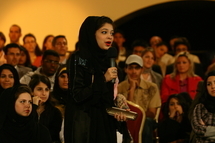 DAOUD KUTTAB
DAOUD KUTTAB
You do have, you do have some Arab emotion in you?
AUDIENCE (M)
No, I don't.
DAOUD KUTTAB
You just said it, you just said it.
AUDIENCE (M)
Well, even if I have Arabhood, I will hide it because I am embarrassed when I see the Arab leaders, that they cannot actually share an opinion.
DAOUD KUTTAB
I agree with you.
AUDIENCE (M)
They cannot even set up a meeting.
DAOUD KUTTAB
I agree with you. I feel the same embarrassment.
AUDIENCE (M)
His Highness...
TIM SEBASTIAN
All right, we heard what you said. We heard what you said. Nasser al-Khalifa you wanted to come in here.
NASSER AL-KHALIFA
Well Daoud, do you want to deprive him of being a human? Of course he is a Muslim, so you know, you are just playing with this emotion, with this idea of technologies.
DAOUD KUTTAB
"The House believes that Gaza ... Arab unity is dead." It's not dead.
NASSER AL-KHALIFA
With the globalisation you know... as if globalisation belongs to the Arabs only. Globalisation is for everybody else, and you cannot show any one of us that there is Arab unity after Gaza. In my opinion there was none before and it is worse now. There won't be none after.
TIM SEBASTIAN
Okay, all right. Did you want to say something, Abdulaziz, briefly?
ABDULAZIZ SAGER
It's his right to feel whatever would like to see, but he's one out of 300 million, so we understand your frustration, we understand your sort of notion that you have this sort of disappointment, but it doesn't mean that ...
TIM SEBASTIAN
You're saying he's alone?
ABDULAZIZ SAGER
I'm not saying he's alone. I'm saying that he can work on himself to help to change that, to improve that, to voice out his voice in others.
AUDIENCE (M)
How can I voice out my opinion if actually my leaders are actually oppressing me to not talk. My leaders are in power since 27 years and I am not allowed to speak. I get the opportunity to speak here in Qatar. Being an Egyptian, I am not allowed to go back to Egypt and say whatever I want because my leader will not agree about that. Where is Arab unity?
DAOUD KUTTAB
There is an Egyptian blogger who took a picture of people being tortured by the police, put it on You Tube, and never has any policeman in Egypt been ever tried, and as the result of this blogger, his name is Wael Abbas, a policeman was actually tried for torture. There is hope. It's very small, it's very difficult. We all have to fight, but there is hope.
TIM SEBASTIAN
Well, there's hope at least that you have a platform here in Doha where you can express some of those views. Thank you very much. Gentleman in the second row.
AUDIENCE (M)
I'm an Arab citizen from Mecca. My question is really about the essentialism, the false essentialism that is being given to the term ‘unity', perhaps what we need to do is talk about it with a capital U - Unity. Are we trying too hard to create an agency to the word unity? Are we not entering a phase where unity can be many unities? Are we living a time where we're facing two unities at this stage, the moderate states and now as we can see, the Syrio-Qatari new era of a new unity. Maybe the days of having the Arab League based in Egypt is long past and maybe we need to think about a new age.
TIM SEBASTIAN
So what is your point? That you're looking for a new definition of unity or ...
AUDIENCE (M)
Perhaps... do we accept that maybe that that unity is buried but new unities are coming in. The fallacity of the Arab nations state and the ...
TIM SEBASTIAN
I think Nasser Khalifa would disagree with you, that new unities are coming up.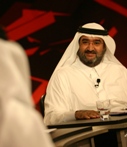 NASSER AL-KHALIFA
NASSER AL-KHALIFA
Yes. I think what you are saying too is that a new division is in the making. Yes, there is a new division in the Arab world and it really became clear since 2006. I mean, we have been going through this downhill for the past three years, so there's, you know, you cannot say there are two types of unity. We are talking about the unity of the Arab world, i.e. when you have an open borders, when you have equality, justice, rule of law, when you have the right to vote, those who are in power, either to vote them in and to vote them out. We don't have, after Gaza we were really, we were like the king who was naked. We appeared, the whole Arab regimes, failed even to raise their voices. Even today I haven't see an Arab delegation from the Arab League which you are talking about, and the Arab regimes, going to the United Nations and saying: "We have to have an investigation of all the war crimes the Israelis have committed, and if you are not going to do it," - and they can do it, they can go to the Security Council and there might be a veto, but they can go to the General Assembly which is the legislative body and ask for a new investigative team and a new court to bring the criminal to justice. They haven't done it yet.
TIM SEBASTIAN
Okay, Abdulaziz.
ABDULAZIZ SAGER
I just need to update the information that yesterday there was a meeting in Morocco and everybody was there to present all the crime acts the Israelis have done and they're putting all the acts together, putting a good legal team together to present a case against Israel, so I think the act is there.
NASSER AL-KHALIFA
Under who?
ABDULAZIZ SAGER
No, it's all the Arab states together that have met yesterday under the umbrella of the organisation in Morocco ...
TIM SEBASTIAN
All right, I'm going to take a question from the gentleman right at the back, you sir.
AUDIENCE (M)
Assalaam aleikum.
TIM SEBASTIAN
Where are you from please?
AUDIENCE (M)
I'm from Qatar, I'm Qatari. I want to ask Mr. Kuttab, why would unity under the ethnicity of being Arab be beneficial for the Arab people? I mean, the United States did not unite because they are American or because of ethnicity - they united under democracy and under their constitution. The same thing with the European Union - you see Slavic nations within the European Union..
TIM SEBASTIAN
I'm sorry, I can't understand your question very easily.
AUDIENCE (M)
The question is, why would unity under Arab ethnicity be beneficial for us? How would it be achieved?
DAOUD KUTTAB
I mean, it was mentioned here. I mean obviously Arab unity will strengthen the different positions of Arabs. People will be able to travel, people will be able to go back and forth without any restrictions, and the economy - I mean, five to ten percent of inter-Arab economy is, of economy... is from inter-Arab trade. We sell things from the Arab world to Europe and Europe sells it back to us, instead of selling it to each other, so there are many benefits to Arab unity and I agree that we are a long way from that, but the question is, how do we reach unity? Do we accept the reality or do we change it?
AUDIENCE (M)
Yes but my question is, why would we unite under being Arab? Why couldn't we unite under democracy or under religion or any other thing?
TIM SEBASTIAN
Why do Arabs need to unite?
DAOUD KUTTAB
I think there is strength in unity, it's very clear. Today countries like France and Germany who fought two world wars see that they can benefit more economically by having the euro. You have in the Gulf countries so many different countries, different currencies, so there is economic benefit, there is social benefit.
TIM SEBASTIAN
Let me just go back to the questioner. Do you see any point in Arabs uniting?
AUDIENCE (M)
I don't think that ...
TIM SEBASTIAN
Just because they are Arabs and speak Arabic.
AUDIENCE (M)
Yes, just because they are Arabs I don't think they should unite under their ethnicity or under language. I mean, they should unite under a political constitution.
TIM SEBASTIAN
Nasser Khalifa, do you agree with that?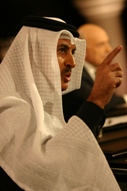 NASSER AL-KHALIFA
NASSER AL-KHALIFA
No, I think Arab unity is good for the whole Arab people because you will have stronger governments, stronger institutions, freedom, democracy, and you can defend yourself. Don't forget in1990, Kuwait was taken in less then 24 hours. Without Arab unity, you cannot protect the Gulf from dangers. Look what happened in the past few months when a few pirates, Somali pirates, stopped even all our trade and increased our insurance on all our business and that shows you that you need Arab unity. I know a lot of people in the world because of their wealth, they think that because of this we should have this small club.
TIM SEBASTIAN
Okay. All right.
NASSER AL-KHALIFA
You cannot protect these small clubs by these small numbers.
TIM SEBASTIAN
Abdulaziz Sager, what points did you want to make?
ABDULAZIZ SAGER
You know, if we need an Arab unity, how come that is dead and buried? We said we need Arab unity.
TIM SEBASTIAN
You need it, doesn't mean it's there, does it?
NASSER AL-KHALIFA
I'm talking about the future, that it is needed. It is for them to make it, it's not for you and them. We failed, I'm sorry, we failed.
TIM SEBASTIAN
Okay, all right. Lady in the sixth row, you have a question.
AUDIENCE (F)
Good evening. I'm Lebanese and my question is to the speakers opposing the motion. You talk about emotional and cultural unity, but what about the fact that there are today pro-American Arabs opposing pro-Iranian Arabs. Don't you think that unity is also in political interests and objectives?
TIM SEBASTIAN
Daoud Kuttab, do you want to take that? You're being very polite.
DAOUD KUTTAB
No, I will let him (Abdulaziz Sager) answer that.
TIM SEBASTIAN
You don't want to answer it. Okay, all right.
ABDULAZIZ SAGER
So your question, why do we have a pro-American Arab?
AUDIENCE (F)
My question is, today there are pro-American Arabs opposing pro-Iranian Arabs. Don't you think that unity is not only an emotional and cultural unity, it's also a political unity in interests and objectives.
ABDULAZIZ SAGER
Well, there is a political dimension in that. I mean, nobody denies the fact that there is a political dimension, there's always a political dimension, and if you oppose the Iranian Arab I think basically because of the act and the position of those people with Iran against the Arab ... Our problem with Iran has been the interventionist policy...
TIM SEBASTIAN
But her point is that Arabs are split from top to bottom, that's the point she's making, they're supporting all different factions, there's no unity there. Isn't that the point you are making?
AUDIENCE (F)
Yes, it is.
ABDULAZIZ SAGER
Well, that's your opinion and we do respect your opinion, what you say but ...
TIM SEBASTIAN
So you're going to pass it.
DAOUD KUTTAB
I'll take on this question. There are clear problems in society. We have problems, there are regional problems that are affecting the way governments are run. It is true, as somebody said, we don't, I mean ...
TIM SEBASTIAN
Let's give a name to these problems. Disunity.
DAOUD KUTTAB
No, no, I would say there are regional problems. There are regional problems. There are countries, there are interests - the US, the Saudis, and Kuwait is trying to get the US to protect them from possible attack by other countries. These are real things. I mean, the occupation of Kuwait is a reality, so ...
ABDULAZIZ SAGER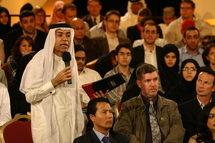 Not necessarily the same, I mean, Mauritania interests which is part of the Arab League is the same interests as the Kingdom of Bahrain, so sometimes, you know, there are differences and this difference does not mean ...
Not necessarily the same, I mean, Mauritania interests which is part of the Arab League is the same interests as the Kingdom of Bahrain, so sometimes, you know, there are differences and this difference does not mean ...
TIM SEBASTIAN
Let's get the questioner back. Do you feel that you've had something resembling an answer?
AUDIENCE (F)
No. My point is, there is a proven disagreement between Arabs on political interests and political objectives. Don't you think that this is a very important part of unity? How can you consider unity with only emotional support?
ABDULAZIZ SAGER
But that's normal. I just mentioned the two examples before within the EU, how the EU, they were not united in their position on Afghanistan, on the invasion of Iraq.
TIM SEBASTIAN
So who says the EU is united?
ABDULAZIZ SAGER
No, the EU is united in terms of acts. They have an organisation, they're part of NATO, they do have a body, a political body that they act through.
TIM SEBASTIAN
The EU is different from NATO.
ABDULAZIZ SAGER
I know the EU is different but I see EU members are part of NATO, so they do have a military body.
DAOUD KUTTAB
To be united doesn't mean that all the countries have to duplicate, equal, carbon-copy plans. To be united means that there are interests in which all Arabs are united behind - economic, social, political, national interest. If all the Arabs are united about Palestine but they don't enforce that unity because they allow external forces to change them.
NASSER AL-KHALIFA
Thank you, Daoud. You just wrote the point which proved our position. You see, even Arab states in the Gulf, they don't even agree how to treat their neighbours. The biggest and the most powerful regional power in the Gulf is Iran, and they are our neighbours whether we like it or not. Geography is politics. They are my neighbours, I have to live with them, I have to work with them, and I have to protect my interests but I should not be used by outside powers to, you know, instead of concentrating on Israel which occupied Arab lands and killed Arabs, to create a new enemy that is Iran. That is wrong, and that's what the Arab regimes, some of them, they try it to create a diversion from Israel to Iran.
TIM SEBASTIAN
All right. Lady in the fourth row, you have a question.
AUDIENCE (F)
Good evening. I'm Syrian, I'm Omani. Mr. Nasser and Mr. Mouin, my question is, if you think there is no unity in the first place, then do you think there will ever be unity in the Arab world according to the conditions we are in now?
TIM SEBASTIAN
Mouin Rabbani.
MOUIN RABBANI
Well, I certainly hope there will be but that's mere speculation. The only the thing I can really say with certainty is that given the current state system in the Arab world, and the current regional institutions, not only is there no unity, there can be no unity and only after the state system and its regional institutions have been thoroughly overhauled can we begin to speak with any confidence about what might be in the future.
DAOUD KUTTAB
Can I ask a question? Mouin, how do we do that?
TIM SEBASTIAN
It's a free forum.
MOUIN RABBANI
Excuse me?
DAOUD KUTTAB
Can you tell us and the people here how do we reach that? You said that there is a possibility, so you don't say it's dead because dead doesn't ...
MOUIN RABBANI
No.
DAOUD KUTTAB
There's no resurrection, but since you have opened a chance for Arab unity, tell us how we can reach that.
MOUIN RABBANI
Well, I don't think it's a simple solution that applies across the board. You have, you know, many different systems in the Arab world.
DAOUD KUTTAB
How can we do that? How do we reach Arab unity, in your own definition?
MOUIN RABBANI
Well, I mean, I think that's a complex and much longer discussion. I think the point that needs to be made here is that even having this discussion is pointless under the current reality. Those who are entrusted with forging Arab consensus, with finding common Arab interests, with acting in a co-ordinated fashion, have killed and buried Arab unity.
TIM SEBASTIAN
Let me ask the questioner here, do you think that it's a pointless discussion while things are the way they are?
AUDIENCE (F)
I mean, I think you all agree that we need unity now, but what do we do next? I mean, you all say that we don't have it yet, so what do we do next? What's the next step?
TIM SEBASTIAN
Can I ask you what do you need unity for? What will this unity do you think do for you?
AUDIENCE (F)
Well, any nation is stronger with unity. I mean, we need a place to belong to. We need to be stronger, I mean, we're very weak, we're always following other nations, that's not a very good situation to be in.
TIM SEBASTIAN
Nasser Khalifa.
NASSER AL-KHALIFA
Well, I, you know, it is up to you, it is up to the young people to struggle harder than what we have done. We failed. We were all bought by our political regimes and we failed, and at the same time we used to work under very severe conditions. When I was your age, I had one hundred percent hope. When I became 25, I had only 20 percent. When I became my age now, I have zero hope because the political system in the Arab world killed all my hope, so you have to fight for it.
TIM SEBASTIAN
All right, gentleman in the second row, you sir.
AUDIENCE (M)
I'm from Malaysia. I have got a question to Mr. Nasser and Mouin Rabbani. The Arab world has two potentially very powerful unifying factors. One is the religion of Islam, the second is the Arabic language, but why is it that we are still finding unity so elusive? Thank you.
TIM SEBASTIAN
Mouin Rabbani.
MOUIN RABBANI
I think the problems we're facing today are that this region's regimes are based on increasingly narrow domestic constituencies and increasingly intimate sponsorship by foreign powers, to put it politely. So how can such governments, how can such regimes, which can't even take care of their national interests, which have only regime interests, how can they possibly serve regional interests? It's illogical and irrational to believe that they ever could.
TIM SEBASTIAN
Abdulaziz Sager.
ABDULAZIZ SAGER
I mean, there was a lot of external factors that have really, you know, devastated and pushed the Arab unity away, the external intervention. This part of the world was under occupation for many years, and again between the ‘50s and the ‘60s we've had a lot of civil war, like in ‘58 and ‘62 and ‘63 between Iraq, Syria, you know, a lot of these things. You know, it is a fact that it has affected the Arab unity and it did hurt it a little bit, but it was never, it never disappeared. It's always there. Whenever we have a problem, whenever we have war, the whole question of Arab unity comes into the table and comes into a debate and discussion.
MOUIN RABBANI
At the popular level, yes. You gave the example of the Arab peace initiative. The fact of the matter is that the Arabs have been so comatose, so incapable of, the Arab states collectively, have been so incapable of making any progress towards achieving the implementation of this initiative that the 2-state settlement probably no longer exists because of developments on the ground.
ABDULAZIZ SAGER
But they were supposed to be the honest broker, the United States and the other...
MOUIN RABBANI
Who gave you that illusion?
ABDULAZIZ SAGER
Sorry?
MOUIN RABBANI
Who would have an illusion that the US could be an honest broker between Israel and the Arabs?
ABDULAZIZ SAGER
A country was based in democracy and support of human rights issues, we would have expected from them to be an honest broker. This is why our expectation now...
TIM SEBASTIAN
We're not debating whether the US is an honest broker or not, we're debating Arab unity.
ABDULAZIZ SAGER
I know, but still, I mean, you know, part of that solution, you know, for the Israeli conflict, I mean, just we were talking about the Israeli-Palestinian conflict, again our hope now from you know, President Obama is to put, you know, the Arab-Israeli conflict in the top of the agenda and not to talk about it six months before he leaves office.
MOUIN RABBANI
But it's hope. We need to look at reality.
NASSER AL-KHALIFA
I think we need to answer the question. To answer your question, sir, we have suffered, and we have suffered from two elements. One is the international element, the Arab world from Morocco to Oman, is in the best location, have a lot of resources. We've been divided by the colonial powers and then whatever God gave us, oil and gas, became the envy of those colonial powers. To protect their interests, they created political elites, a new colonial class but they are not John or Jeremy, they are Nasser or Mohamed or Ahmed. I mean, they are one of us, some of them our relatives or our friends.
TIM SEBASTIAN
All right.
NASSER AL-KHALIFA
... and that's why we cannot have Arab unity, and that's why we failed.
TIM SEBASTIAN
I'm just going to go briefly to a final question from the lady in the third row.
AUDIENCE (F)
Good evening. My question is to Dr. Al-Khalifa. You said after Gaza, Arab unity is dead and buried. My question is, what's the other alternative for the Arab countries?
NASSER AL-KHALIFA
Oh, that is very difficult.
TIM SEBASTIAN
But we need a brief, a very brief answer on this.
NASSER AL-KHALIFA
Yes. For the people it's to fight for their human rights, to stress the importance of democracy and the rule of law, to get rid of dictators, and for governments - either they are going to change or they are going to go through what happened in the French revolution. That is my answer in the long term.
TIM SEBASTIAN
Daoud Kuttab.
DAOUD KUTTAB
If you believe in human rights, individual rights, then you should vote against this motion because this motion is clearly not in favour of human rights. If you are a young person like you and you and you and you, and you believe in human rights, then you should vote against this motion.
Vote result
TIM SEBASTIAN
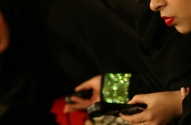 All right, okay, that's exactly what we're going to do, is vote on the motion now, that "This House believes that after Gaza, Arab unity is dead and buried." If you'd like to pick up your voting machines, let me just explain what you do. If you want to vote for the motion, that is the side represented by Nasser Khalifa and Mouin Rabbani, you will be pressing button one, the ‘yes’ button. If you want to vote against the motion, that is the side represented by Daoud Kuttab and Abdulaziz Sager, you press button two, the ‘no’ button and will you please press the appropriate one now. You only have to press it once. Thanks to the miracles of modern science, your vote will be communicated directly to the computers and we'll have the result for you in just over 20 seconds' time. All right, here is the vote. There we have it, ladies and gentlemen, 77 percent for the motion, 23 percent against. The motion has been resoundingly carried. All I have to do now is to thank our distinguished panellists, thank you very much indeed for coming tonight. And thank you to you, the audience. And just to remind you that the next Doha Debates will be coming from Georgetown University in Washington, we're very excited about that, in just over a month's time. Till then, from all of us on the Doha Debates, thanks very much for coming, have a safe journey home. Good night, good night!
All right, okay, that's exactly what we're going to do, is vote on the motion now, that "This House believes that after Gaza, Arab unity is dead and buried." If you'd like to pick up your voting machines, let me just explain what you do. If you want to vote for the motion, that is the side represented by Nasser Khalifa and Mouin Rabbani, you will be pressing button one, the ‘yes’ button. If you want to vote against the motion, that is the side represented by Daoud Kuttab and Abdulaziz Sager, you press button two, the ‘no’ button and will you please press the appropriate one now. You only have to press it once. Thanks to the miracles of modern science, your vote will be communicated directly to the computers and we'll have the result for you in just over 20 seconds' time. All right, here is the vote. There we have it, ladies and gentlemen, 77 percent for the motion, 23 percent against. The motion has been resoundingly carried. All I have to do now is to thank our distinguished panellists, thank you very much indeed for coming tonight. And thank you to you, the audience. And just to remind you that the next Doha Debates will be coming from Georgetown University in Washington, we're very excited about that, in just over a month's time. Till then, from all of us on the Doha Debates, thanks very much for coming, have a safe journey home. Good night, good night!
Watch online

